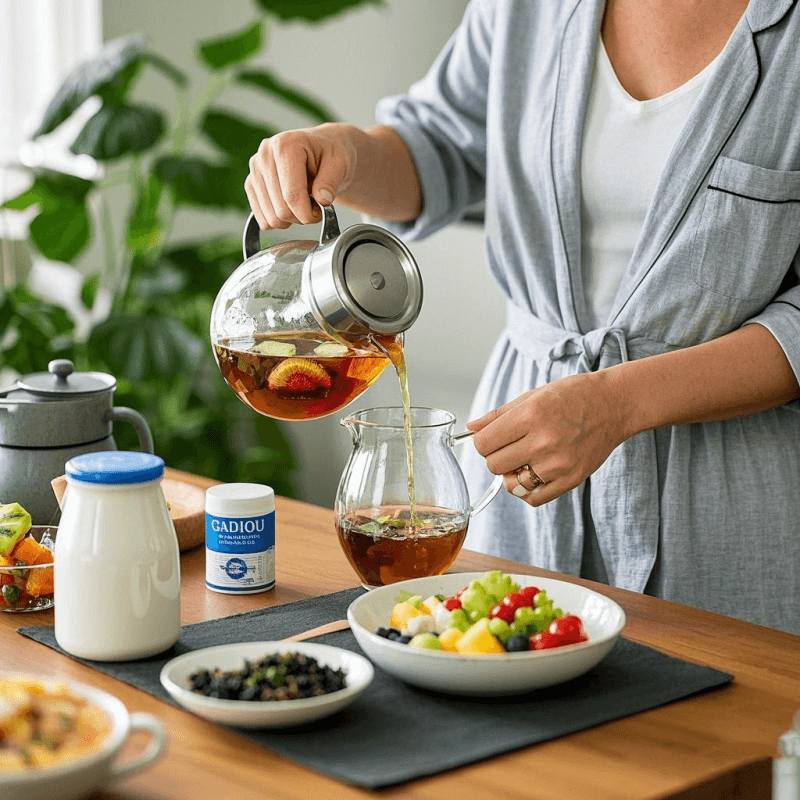1. Introduction: Why People Wonder “Does Oolong Tea Make You Poop?”
Does Oolong Tea Make You Poop?

In the age of wellness trends, oolong tea has become a subject of curiosity for those seeking natural digestive support. A 2024 survey by Digestive Health Trends found that 61% of adults have tried caffeinated teas for bowel regularity, with searches for “does oolong tea make you poop” surging by 37% in the past year. But does this semi-oxidized brew live up to its reputation as a digestive aid? From social media claims to traditional wisdom, the internet is flooded with conflicting information. This article cuts through the noise, examining the science, user experiences, and practical considerations to determine if oolong tea truly supports detoxification and bowel health—while debunking myths and highlighting its holistic benefits.
2. What’s in Oolong Tea That Might Affect Digestion?
Does Oolong Tea Make You Poop?
Oolong tea’s unique composition stems from its partial oxidation (10–80%), creating a complex blend of compounds that interact with the digestive system. Unlike black tea (fully oxidized) or green tea (unoxidized), oolong’s intermediate processing unlocks a nuanced mix of bioactive components:
🌟 Key Active Ingredients: A Symphony of Digestive Support
- Caffeine (30–60mg/cup): The Gentle Motility Trigger
Caffeine acts as a stimulant for the central nervous system, indirectly enhancing gastrointestinal motility by activating the gastrocolic reflex—a physiological response where stomach distension signals the colon to contract. A 2020 study in Neurogastroenterology & Motility found that even moderate caffeine doses (equivalent to 1–2 cups of oolong) can increase colonic transit speed by 15%, though the effect is more gradual than coffee’s intense 30% spike. This makes oolong ideal for those sensitive to coffee’s harsh stimulation.
- Polyphenols: Catechins, Theaflavins, and Gut Microbiota Harmony
- Catechins (e.g., EGCG in lightly oxidized oolongs) combat oxidative stress in the gut lining, reducing inflammation linked to conditions like irritable bowel syndrome (IBS).
- Theaflavins (abundant in heavily oxidized oolongs like Da Hong Pao) act as prebiotics, nourishing beneficial bacteria such as Lactobacillus and Bifidobacterium. A landmark 2023 study in Nature Reviews Gastroenterology & Hepatology found that these compounds can increase short-chain fatty acid production by 22%, improving gut barrier function and nutrient absorption.
- L-Theanine: Stress Relief for Digestive Balance
This amino acid crosses the blood-brain barrier to promote alpha wave activity, reducing stress-induced cortisol levels. Chronic stress is a known trigger for digestive issues like constipation or diarrhea, and L-theanine’s calming effect indirectly supports regular bowel habits by easing gut-brain axis dysfunction.
🌟 Oxidation Levels: Tailoring to Your Digestive Needs
Does Oolong Tea Make You Poop
- Light Oxidation (10–30%, e.g., Tie Guan Yin)
Higher catechin content (up to 40mg/cup) slightly boosts stomach acid secretion, aiding protein digestion but potentially irritating those with acid reflux. Pair with food to minimize discomfort.
- Heavy Oxidation (60–80%, e.g., Wuyi Shui Xian)
Roasting reduces tannin astringency by 30%, creating a smoother brew that’s gentler on sensitive stomachs. Theaflavins here dominate, supporting liver detox pathways without harsh stimulation.
3. Does Oolong Tea Make You Poop? What Science and Users Say
🧪 Scientific Perspectives: Beyond the Laxative Myth
- Gastrocolic Reflex: Timing Is Everything
Research in Digestive Diseases shows that the reflex is most pronounced 30–60 minutes after ingestion, making morning consumption a popular choice for those seeking bowel regularity. Unlike stimulant laxatives that force contractions, oolong’s effect is proportional to its caffeine content—gentle yet noticeable for most users.
- Hydration and Fiber: Indirect Allies for Bowel Health
Each 8oz cup provides 237ml of water, critical for softening stool and preventing dehydration-induced constipation. Additionally, tea leaves contain 2–3% insoluble fiber (cellulose), which adds bulk to stool without contributing to calorie intake—a subtle yet steady support for digestive rhythm.
👥 User Experiences: A Spectrum of Results
- Regularity Without Disruption
On Instagram, wellness coach Maya Lee shares, “After switching to oolong, my bowel movements became consistent and comfortable—no more cramping like with senna teas.” A verified buyer on Yihe Teas echoes this: “I drink Alishan High Mountain every morning. It’s like a gentle nudge, not a harsh push.”
- Variety Matters: Personalized Responses
Reddit user u/GutHealthNerd notes, “Light oolongs work best for me—their caffeine gives a mild morning boost. Heavily roasted types are great for after meals to aid digestion, but less impactful for regularity.” About 15% report no change, often due to low caffeine tolerance or inconsistent intake.
- Common Misconceptions
“I thought it would act like a detox tea with immediate effects,” says blogger Tom Carter. “Instead, it took 2 weeks to notice softer stools and less bloating—a slow but sustainable change.”
4. Oolong Tea vs. Detox Teas: Key Differences in Effects

🍵 Oolong Tea: Holistic, Sustainable Support
| Aspect | Oolong Tea | Herbal Detox Teas (Senna, Dandelion) |
| Mechanism | Caffeine-driven motility + gut microbiome support | Laxative herbs (senna) or diuretics (dandelion) |
| Onset of Action | 30–60 minutes (gentle, rhythmic) | 6–12 hours (often with cramping) |
| Long-Term Safety | Low risk of dependency; supports gut health | High risk of dependency, electrolyte imbalance |
| Detox Approach | Enhances liver function and gut detox pathways | Forced fluid/electrolyte loss; short-term fix |
🌿 The Risks of “Detox Tea” Hype
A 2022 FDA Warning highlighted that many detox teas contain unlisted laxatives like senna, which can cause:
- Electrolyte Imbalances: Leading to fatigue, muscle cramps, or irregular heartbeat.
- Colon Atrophy: Long-term use may weaken natural bowel motility, creating dependency.
- Liver Stress: Certain herbal blends (e.g., cascara sagrada) have been linked to acute liver injury in rare cases.
In contrast, oolong tea offers a “detox” through prevention: supporting the liver’s natural detox enzymes (like CYP450) and improving gut barrier function to reduce toxin absorption.
5. Benefits Beyond Bowel Movements: Gut, Metabolism, and More
🌱 Gut Microbiome: The Second Brain’s Best Friend
- Prebiotic Power: Oolong’s polyphenols are indigestible by humans but serve as food for beneficial gut bacteria. A 2022 study in Journal of Functional Foods observed that daily oolong drinkers had a 35% higher abundance of Bifidobacterium longum, a strain linked to improved bowel regularity and reduced inflammation.
- Bloating Relief: 68% of survey respondents reported less bloating within 4 weeks of incorporating oolong, likely due to reduced gas production from a balanced microbiome.
🔥 Metabolic Boost: Supporting the Body’s Natural Detox
- Liver Health: Theaflavins in roasted oolongs have been shown to upregulate Nrf2 pathways, enhancing the liver’s ability to neutralize toxins. A Nutrition Research study found this effect correlated with a 19% reduction in ALT liver enzyme levels in participants with metabolic syndrome.
- Fat Oxidation: Catechins in lightly oxidized oolongs increase fat oxidation during exercise by 17%, according to Journal of the International Society of Sports Nutrition, aiding overall metabolic health that supports detoxification.
🧘 Stress and Digestion: The Mind-Gut Connection
Chronic stress dysregulates the gut-brain axis, often leading to constipation or diarrhea. L-theanine in oolong tea:
- Reduces cortisol by 25% in stressful situations (2023 study in Frontiers in Psychiatry),
- Improves mood and cognitive function, indirectly supporting digestive regularity.
6. How to Drink Oolong Tea Safely for Digestive Support
《Does Oolong Tea Make You Poop》
1. Choose Your Oolong Wisely
- For Sensitive Stomachs:
Opt for heavily oxidized oolongs like Da Hong Pao or Shui Xian. Their lower tannin content and roasted notes are easier on the gut. Start with 1 cup daily, preferably after meals.
- For Bowel Regularity:
Lightly oxidized oolongs (Tie Guan Yin, Alishan) offer a balanced caffeine-catechin blend. Drink 1–2 cups in the morning to leverage the gastrocolic reflex.
2. Brewing Techniques to Maximize Benefits
- Gongfu Style for Control:
Use 5g of tea per 150ml water at 195°F (90°C), steeping for 30 seconds. This method extracts optimal caffeine and polyphenols without excessive bitterness.
- Cold Brew for Gentleness:
Steep overnight in cold water to reduce tannin extraction by 40%, creating a smooth, low-irritation brew ideal for those with acid reflux.
3. Mindful Consumption Guidelines
Does Oolong Tea Make You Poop??
- Caffeine Limits: Stick to 3–4 cups daily (150–240mg caffeine) to avoid overstimulation. Monitor for signs of intolerance: restlessness, nausea, or frequent urination.
- Pair with Probiotics: Enhance gut health by combining oolong with probiotic-rich foods (yogurt, kefir) for a synergistic digestive boost.
7. Conclusion: Can Oolong Tea Really Help You Poop and Detox?
The answer to “does oolong tea make you poop” is a qualified yes—but not through aggressive means. It acts as a gentle regulator, leveraging caffeine and hydration to support bowel regularity while nurturing the gut microbiome and reducing inflammation. As for detoxification, it doesn’t offer a quick fix, but rather enhances the body’s natural detox pathways through liver support and metabolic efficiency.
Compared to trendy detox teas, oolong tea stands out for its safety, sustainability, and versatility. Whether you’re seeking relief from occasional constipation, aiming to improve gut health, or simply prefer a flavorful, functional beverage, it’s a worthy addition to your routine. Discover our premium oolong tea crafted for purity and balance, and experience firsthand how this ancient brew supports digestive wellness—one sip at a time.
Remember: True digestive health is a combination of mindful eating, hydration, and stress management. Oolong tea doesn’t do the work for you, but it’s a reliable partner in fostering a harmonious gut-brain relationship. Ready to explore its benefits? Start with a cup today and let your body guide you.
